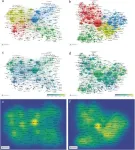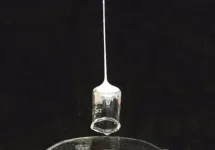(Press-News.org) A new study led by researchers at Queen Mary University of London reveals women would welcome the option to choose between self-sampling and traditional screening done by a nurse or doctor for human papillomavirus (HPV)-based cervical screening.
The study, published in the Journal of Medical Screening, assessed a group of 2,300 women aged 24-65 who had collected their own samples alongside having their standard cervical screening in 38 GP practices across England. Participants were asked about their screening preference and their attitudes toward being offered a choice between the two methods. Researchers explored age, education, ethnicity, and screening experience as predictors of attitudes towards a choice and anticipated future choice.
Of the women surveyed, 85% preferred being given the choice, with 72% stating this choice would enhance their screening experience, and 69% said they would choose to self-sample at home if offered a choice in the future. However, a proportion of women expressed concern about making the choice between screening methods: 23% felt it would be difficult to choose, 15% would worry about making a choice, and 48% would prefer a recommendation. These concerns were reported more frequently by women with fewer qualifications, compared to women with degree-level education.
Researchers believe these findings highlight an urgent need to explore and evaluate different methods of offering this choice, ensuring that effective messaging is used during any implementation or assessment of HPV self-sampling options in the UK and beyond.
Senior author, Jo Waller, Professor of Cancer Behavioural Science, Centre for Cancer Screening, Prevention and Early Diagnosis at Queen Mary University of London’s Wolfson Institute for Population Health said: “This study confirms that choice would generally be welcomed when it comes to cervical screening. For many, self-sampling would be a more convenient and acceptable option, but others prefer the reassurance of knowing a nurse or doctor has done the test”.
Dr Laura Marlow, Senior Research Fellow at Queen Mary University of London, and the study’s first author said: “It was striking that a significant number of our participants said they would like a recommendation. We need to keep this in mind when thinking about how best to make self-sampling available, to make sure that having to make a choice doesn’t become an additional worry or burden, and to avoid exacerbating social inequalities in screening uptake”.
Public Health Minister, Andrew Gwynne said: “We know the earlier cancer is caught, the easier it is to treat, so it’s crucial that access to screening and tests is made as simple as possible.
"I welcome this research and the government is working closely with the UK National Screening Committee to explore the potential of self-sampling.”
Cervical cancer is one of the most preventable types of cancer. However, data show that uptake of in-person screening offered through the NHS Cervical Screening Programme is at an all-time low in England. In 2023, data from NHS England showed that about one in three eligible women, aged between 25–64 are not up to date on their cervical cancer screening. This study comes as more flexible screening methods such as self-testing are being explored to increase participation and make the screening service more accessible for women.
ENDS
NOTES TO EDITORS
Contact
Faustine Akwa
Senior Media Relations Officer – External Relations Directorate
Queen Mary University of London
Email: f.akwa@qmul.ac.uk or press@qmul.ac.uk
Tel: 020 7882 3600
Paper details:
L. Marlow, H. Drysdale, J. Waller. “Attitudes towards being offered a choice of self-sampling or clinician -sampling for cervical screening: A cross-sectional survey of women taking part in a clinical validation of HPV self-collection devices.” Published in the Journal of Medical Screening.
DOI: 10.1177/09691413241283356
Under strict embargo until 00.01 (UK Time) 10 October 2024
A copy of the paper is available upon request.
Conflicts of interest: The authors declared no potential conflicts of interest with respect to the research, authorship, and/or publication of this article.
Funded by: Department of Health and Social Care (DHSC).
About Queen Mary University of London
www.qmul.ac.uk
At Queen Mary University of London, we believe that a diversity of ideas helps us achieve the previously unthinkable.
Throughout our history, we’ve fostered social justice and improved lives through academic excellence. And we continue to live and breathe this spirit today, not because it’s simply ‘the right thing to do’ but for what it helps us achieve and the intellectual brilliance it delivers.
Our reformer heritage informs our conviction that great ideas can and should come from anywhere. It’s an approach that has brought results across the globe, from the communities of east London to the favelas of Rio de Janeiro.
We continue to embrace diversity of thought and opinion in everything we do, in the belief that when views collide, disciplines interact, and perspectives intersect, truly original thought takes form.
About King’s College London
King’s College London is amongst the top 40 universities in the world and top 10 in Europe (THE World University Rankings 2024), and one of England’s oldest and most prestigious universities. With an outstanding reputation for world-class teaching and cutting-edge research, King’s maintained its sixth position for ‘research power’ in the UK (2021 Research Excellence Framework).
King's has more than 33,000 students (including more than 12,800 postgraduates) from some 150 countries worldwide, and 8,500 staff.
For nearly 200 years, King’s students and staff have used their knowledge and insight to make a positive impact on people, society and the planet. Focused on delivering positive change at home in London, across the UK and around the world, King’s is building on its history of addressing the world’s most urgent challenges head on to accelerate progress, make discoveries and pioneer innovation. Visit the website to find out more about Vision 2029, which sets out bold ambitions for the future of King’s as we look towards our 200th anniversary.
World-changing ideas. Life-changing impact: kcl.ac.uk/news
END
Study reveals 85% of women prefer choice between self-sampling and traditional cervical screening
Research highlights growing demand for more flexibility and accessible cervical cancer testing options.
2024-10-10
ELSE PRESS RELEASES FROM THIS DATE:
Global advances and future trends in cervical cancer research from 2013 to 2022
2024-10-10
With ongoing advancements in cervical cancer research, the global scientific community has gained a more comprehensive understanding of this significant threat to women's health. A research team led by Professor Weimin Kong has recently published a paper titled "Hotspots and frontiers in cervical cancer research: a bibliometric and visualization analysis from 2013 to 2022" in the internationally renowned journal Malignancy Spectrum. The study systematically analyzed the development trends and research hotspots in global cervical cancer research over the past decade using bibliometric methods.
The research ...
Inspired by Spider-Man, a lab recreates web-slinging technology
2024-10-10
Every kid who has read a comic book or watched a Spider-Man movie has tried to imagine what it would be like to shoot a web from their wrist, fly over streets, and pin down villains. Researchers at Tufts University took those imaginary scenes seriously and created the first web-slinging technology in which a fluid material can shoot from a needle, immediately solidify as a string, and adhere to and lift objects.
These sticky fibers, created at the Tufts University Silklab, come from silk moth cocoons, which are boiled in solution and broken down into their building block proteins called fibroin. ...
Applied Microbiology International’s 2024 Honorary Fellowship goes to Dr Chikwe Ihekweazu
2024-10-10
Applied Microbiology International (AMI) is delighted to announce that its 2024 Honorary Fellowship goes to Dr Chikwe Ihekweazu, who is Assistant Director General at the World Health Organization (WHO), leading the WHO Hub for Pandemic and Epidemic Intelligence.
AMI Honorary Fellowships are given to individuals who have made an outstanding contribution to or impact on the field of applied microbiology. Honorary Fellows of AMI are nominated and chosen each year by the organisation’s membership.
Chikwe ...
Pitt scientists validate new lab test platform for blood biomarkers of Alzheimer's disease
2024-10-10
University of Pittsburgh scientists independently validated a new blood test platform that can simultaneously measure more than a hundred biomarkers of Alzheimer's disease. The platform might improve clinicians’ ability to capture the multifaceted nature of Alzheimer’s pathology and streamline early disease diagnostics. The report was published in Molecular Neurodegeneration today.
“Alzheimer’s disease should not be looked at through one single lens,” said senior author Thomas Karikari, Ph.D., M.Sc., assistant professor of psychiatry at Pitt. “Capturing aspects of Alzheimer’s pathology in a panel of clinically validated biomarkers would increase ...
No bolts about it: New technology improves structural strength
2024-10-09
In a collaborative effort between Texas A&M University and Sandia National Laboratories, researchers have significantly improved a new joining technology, interlocking metasurfaces (ILMs), designed to increase the strength and stability of a structure in comparison to traditional techniques like bolts and adhesives, using shape memory alloys (SMAs). ILMs offer the potential to transform mechanical joint design in manufacturing for aerospace, robotics and biomedical devices.
“ILMs are poised to redefine joining technologies ...
Medical professionals must lead the fight against climate misinformation
2024-10-09
Medical professionals have a responsibility to lead the fight against climate misinformation to ensure that the public is well informed about the health risks posed by climate change, say experts in The BMJ today.
Misinformation (inaccurate information spread without malicious intent) and disinformation (deliberately deceptive information) in health is not new, write Professor Andy Haines and colleagues.
Just as the rapid spread of false information during the covid-19 pandemic undermined public trust in science and public health interventions, false information also pervades the climate change debate, influencing public perception and ...
Should doctors be suspended for unlawful climate activism?
2024-10-09
Former GP Sarah Benn was suspended by the medical practitioners tribunal service (MPTS) after an arrest for her involvement in climate protests. In The BMJ today, two experts debate the question of when and whether doctors in such cases should be sanctioned.
The recent case of Sarah Benn has sparked debate, partly because of a perception that the GMC referred her to a MPTS tribunal for taking part in peaceful protests, says Andrew Hoyle, assistant director at the GMC.
In reality, he explains ...
Extreme rainfall linked to heightened risk of death
2024-10-09
Extreme rainfall events are associated with an increased risk of death from all causes as well as from heart and lung diseases, finds an analysis of data from 34 countries and regions published by The BMJ today.
The health effects of extreme rainfall varied by local climate and vegetation coverage, providing a global perspective on the effect of extreme rainfall events on health.
Climate change is intensifying the frequency and severity of short term rainfall events, and emerging evidence suggests a compelling link between rainfall events and adverse health outcomes, particularly transmission ...
New research highlights the overlooked dangers of subtle and covert abuse in intimate relationships
2024-10-09
Peer-reviewed – Scoping Review - People
New research from the University of East Anglia has uncovered a significant gap in understanding of a harmful form of domestic abuse known as subtle or covert abuse.
Unlike more obvious forms of physical or verbal abuse, subtle abuse is less visible but can be just as damaging to victims.
The review found that current research on this topic is limited, despite its potentially widespread impact.
The findings suggest that subtle abuse ...
Snowflake dance analysis could improve rain forecasts
2024-10-09
The key to more accurate rainfall predictions may lie in the intricate dance of falling snowflakes, a new study has found.
The research, observing the physical motion of falling ice crystals, will help scientists better estimate where and when these crystals will melt into raindrops, a crucial stage in the formation of many types of rain.
Published today (Thursday 10 October) in the journal Atmospheric Chemistry and Physics, the study involved scientists watching how fake snowflakes fell in a substance ...
LAST 30 PRESS RELEASES:
Buck Institute launches Healthspan Horizons to turn long-term health data into Actionable healthspan insights
University of Ottawa Heart Institute, the University of Ottawa and McGill University launch ARCHIMEDES to advance health research in Canada
The world’s largest brain research prize awarded for groundbreaking discoveries on how we sense touch and pain
Magnetofluids help to overcome challenges in left atrial appendage occlusion
Brain-clearing cells offer clues to slowing Alzheimer’s disease progression
mRNA therapy restores fertility in genetically infertile mice
Cloaked stem cells evade immune rejection in mice, pointing to a potential universal donor cell line
Growth in telemedicine has not improved mental health care access in rural areas, study finds
Pitt scientists engineer “living eye drop” to support corneal healing
Outcomes of older adults with advanced cancer who prefer quality of life vs prolonging survival
Lower music volume levels in fitness class and perceived exercise intensity
Of crocodiles, counting and conferences
AERA announces 2026 award winners in education research
Saving two lives with one fruit drop
Photonic chips advance real-time learning in spiking neural systems
Share of migratory wild animal species with declining populations despite UN treaty protections worsens from 44% to 49% in two years; 24% face extinction, up 2%
One in 20 babies experiences physical abuse, global review finds
Tundra tongue: The science behind a very cold mistake
Targeting a dangerous gut infection
Scientists successfully harvest chickpeas from “moon dirt”
Teen aggression a warning sign for faster aging later in life
Study confirms food fortification is highly cost-effective in fighting hidden hunger across 63 countries
Special issue elevates disease ecology in marine management
A kaleidoscope of cosmic collisions: the new catalogue of gravitational signals from LIGO, Virgo and KAGRA
New catalog more than doubles the number of gravitational-wave detections made by LIGO, Virgo, and KAGRA observatories
Antifibrotic drug shows promise for premature ovarian insufficiency
Altered copper metabolism is a crucial factor in inflammatory bone diseases
Real-time imaging of microplastics in the body improves understanding of health risks
Reconstructing the world’s ant diversity in 3D
UMD entomologist helps bring the world’s ant diversity to life in 3D imagery
[Press-News.org] Study reveals 85% of women prefer choice between self-sampling and traditional cervical screeningResearch highlights growing demand for more flexibility and accessible cervical cancer testing options.




